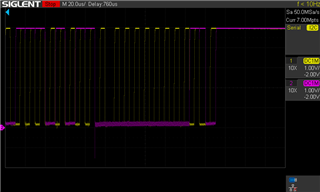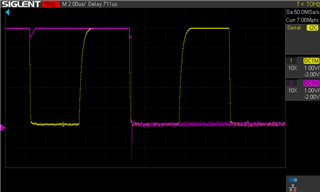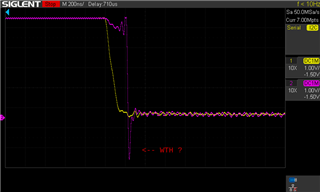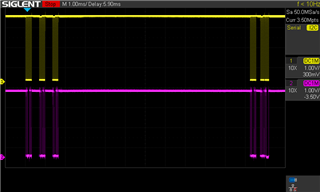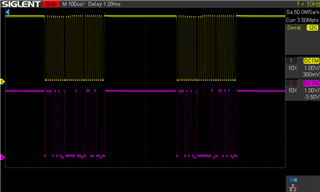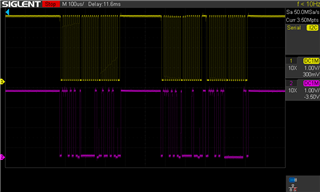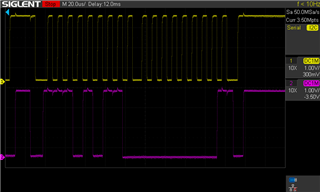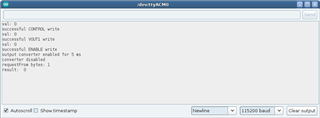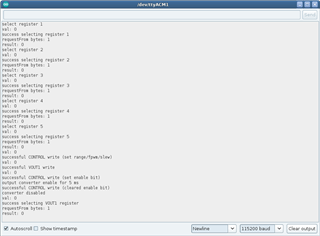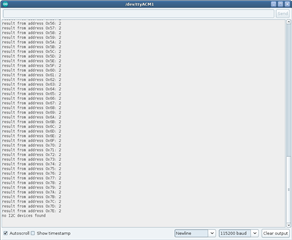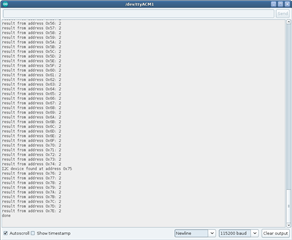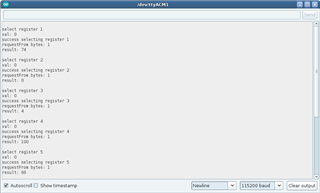Other Parts Discussed in Thread: TPS63810, USB2ANY, TPS63810EVM, TPS63811
I am using an Arduino MEGA2560_R3 with TPS63811EVM module, communication via I2C (Wire library). I am able to write to device registers but seem to be experiencing an error reading register values. Even without being able to read back the register values, I can confirm the register writes work because of outputs changing as expected after reg write. My simplified my Arduino sketch which demonstrates the problem:
// board jumpers: VSEL pin jumper selects VOUT1 register, EN jumper sets EN_PIN to ON
// external 10k pull-up resistors pigtailed on SDA, SCL I2C lines
// I put some description in the code comments. Hopefully someone can help me fix the problem.
#include <Wire.h>
#define ADDR 0x75 // TPS63811 I2C address
#define CONTROL 0x01 // TPS63811 control register address
#define VOUT1 0x04 // VOUT1 register address
#define VOUT1_RESET 0b0111100 // VOUT1 default bits
/***** using *****
*
* Arduino MEGA2560_R3
* Wire library (I2C)
* TI TPS63811EVM
*
*/
void setup()
{
int val;
uint8_t result = 0x4A;
/* I am using external 10k resistors */
pinMode(7, OUTPUT); // SDA pull-up resistor
pinMode(8, OUTPUT); // SCL pull-up resistor
pinMode(10, OUTPUT); // TPS63811 VIN
/* all 5V */
digitalWrite(10, HIGH); // power on TPS63811
digitalWrite(7, HIGH);
digitalWrite(8, HIGH);
/***** board jumper settings *****
* VSEL jumper is set to select VOUT1
* EN jumper is in the ON position
*/
Serial.begin(115200);
delay(1000);
Wire.begin();
Wire.setClock(100000);
delay(1000);
/* set CONTROL register bits, set RANGE bit prior to setting ENABLE bit (required) */
Wire.beginTransmission(ADDR);
Wire.write(CONTROL); // select control register
Wire.write(0x4A); // 0b1001010, 0x4A - sets range bit, fpwm, slew == 5V/ms
val = Wire.endTransmission();
if (val != 0)
{
Serial.println("error writing initial control register value");
}
/* set VOUT to desired voltage */
Wire.beginTransmission(ADDR);
Wire.write(VOUT1);
Wire.write(0x64); // should yield ~ 4.5V with the RANGE bit set
// Wire.write(0x77); // 0b1110111, 0x77 - will yield 5.0V when RANGE bit set
val = Wire.endTransmission();
if (val != 0)
{
Serial.println("error writing to vout1 register");
}
/* set ENABLE bit in CONTROL register - enables the converter */
Wire.beginTransmission(ADDR);
Wire.write(CONTROL);
Wire.write(0x6A); // 0b1101010, 0x6A - sets range, enable, fpwm and slew bits (converter gets enabled)
val = Wire.endTransmission();
if (val != 0)
{
Serial.println("error setting enable bit in control register");
}
else
{
Serial.println("output converter enabled for 10 seconds");
delay(10000); // load (LED+resistor) connected to VOUT/GND - LED illuminates properly for 10 seconds
Wire.beginTransmission(ADDR);
Wire.write(CONTROL);
Wire.write(0x4A); // clears the enable bit, disabling the converter
val = Wire.endTransmission(); // LED goes dark as it should
Serial.println("converter disabled");
}
/* Everything above works. I have confirmed 4.5V output if I write 0x64 to VOUT1 register.
* I have confirmed 5.0V if I write 0x77 to VOUT1 register. Converter is enabled/disabled as expected
* when setting/clearing the ENABLE bit in the CONTROL register...
* but when I try reading any register value I always get '0' - doesn't matter which register I select,
* they all return 0. I have tried all sorts of things but I can't get it to work.
*
* I read this in the TPS6381x datasheet (section 8.5.2) -
* "Attempting to read data from register addresses not listed in this section results in 00h being read out."
*
* that would explain my problem excecpt that I have checked all my addresses repeatedly (to the point of absurdity)
* and they are all correct.
*/
/***** this read fails - I don't know why *****/
Wire.beginTransmission(ADDR);
Wire.write(VOUT1); // select VOUT1 register
Wire.endTransmission();
Wire.requestFrom(ADDR, 1);
if (Wire.available() == 1) // I get one byte of data as I should
{
result = Wire.read();
}
Serial.print("result: ");
Serial.println(result); // but that byte is always is 0
Wire.end();
}
void loop()
{
Serial.print(".");
delay(1000);
}


